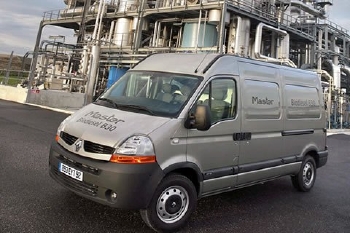 Renault has just launched its first biodiesel-compatible vehicles with the unveiling of Trafic 2.0 dCi B30 and Master 2.5 dCi B30 in France.
Renault has just launched its first biodiesel-compatible vehicles with the unveiling of Trafic 2.0 dCi B30 and Master 2.5 dCi B30 in France.
These are the first expressions of Renault’s commitment to biofuels, made by the company as part of Renault Commitment 2009, whereby all diesel engines sold in Europe by 2009 will be able to run on fuel blends containing 30% biofuel. Renault Commitment 2009 also sets the goal of selling one million vehicles emitting less than 140 grams per kilometre of CO2 by 2008, of which a third less than 120 grams per kilometre. In 2005, Renault sold 20% of all vehicles emitting less than 120 grams per kilometre.
Targeted principally at fleet customers seeking to reduce the CO2 emissions of their vehicles, Trafic is available with either 90hp or 115hp outputs from the 2.0 dCi B30 engine, while Master offers 100hp or 120hp from its 2.5 dCi B30 units. These engines are able to run on diesel or on a diesel/biodiesel mix with up to 30% biodiesel content.
Renault sees biofuels as one of the most efficient and economic ways of controlling CO2 emissions in the medium term, since it is easy to fit this technology on volume production models. “Well to wheel”, they are much more efficient than conventional fuels. An engine running on 30% biodiesel emits up to 20% fewer CO2 emissions than on conventional diesel, depending on the biological source. Produced from vegetable oils or biomass, biofuels are also renewable and diversified energies that limit our dependence on fossil fuels.
Mégane biofuel in 2007
Biodiesel is just one of the offerings in the biofuel range marketed by Renault. In 2007, Renault will be one of the only manufacturers to provide its European customers with a double offer of biofuel-compatible cars and vans. Alongside Trafic 2.0 dCi B30 and Master 2.5 dCi B30, Renault will be launching a 110hp 1.6 16V Mégane running on E85 bio-ethanol in Spring 2007.
“Well to wheel”
To fully appreciate the environmental advantages of biofuels compared with fossil fuels, we should consider the global approach referred to as “well to wheel”. The well-to-wheel approach can be used to make a thorough measure of CO2 emissions right through from the production of the fuel to its consumption by the vehicle.
For fossil fuels, CO2 is emitted during the production (oil extraction and refining), transport and use of the vehicle. Because biofuels are made from biomass, the CO2 emitted by vehicles running on biodiesel is that absorbed by the plants (through photosynthesis) used to make the fuel. The CO2 absorbed by the plants during their growth can therefore be subtracted from the emissions total. Using local resources to produce biofuels also helps limit the CO2 emitted by transporting fuels (by sea or road) to distribution sites. Overall, biofuels are thus less harmful to the environment than conventional fuels.
Together with its work on biofuels, Renault is also committed to developing a range of technologies that are affordable for its customers. These technologies will contribute to reducing the CO2 emissions of its vehicles and limiting global warming. To this end, Renault is looking at a mobility solution based on electric energy and developing a fuel cell as part of the Renault-Nissan Alliance. Renault’s aim is to rank among the top three world automotive manufacturers in terms of reduced CO2 emissions.
Sales in the UK are being considered for 2007, if Her Majesty’s Government makes it an attractive purchase proposition and the availability of biofuels continues to expand.
(Cf. news from 2006-12-12.)
Source
Askaprice, 2006-12-30.
Share
Renewable Carbon News – Daily Newsletter
Subscribe to our daily email newsletter – the world's leading newsletter on renewable materials and chemicals









